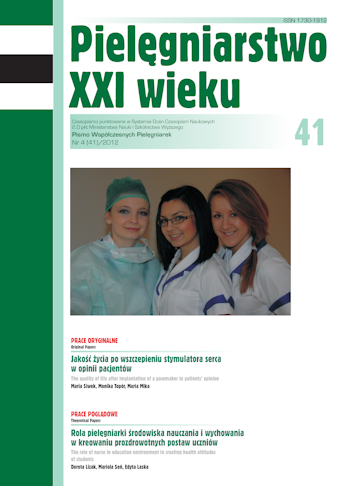Organ donation and transplantation of organs in the opinion of nursing students of bridging course
Keywords:
transplantation, brain death, presumed consent, nurseAbstract
ORGAN DONATION AND TRANSPLANTATION OF ORGANS IN THE OPINION OF NURSING STUDENTS OF BRIDGING COURSE
Introduction. Transplantation is a recognized therapeutic method and a chance to recovery for many patients. There are important regulations for transplantation, that allow the donation of organs for transplantation from people after their death. In Poland, the principle of presumed consent for organ donation or tissue transplantation is in force. According to the regulations, the moment of death is considered the confirmed brain death as actual death of a man. Although transplantation as a treatment method has gained general acceptance, these regulations are not accepted by everybody, because they are facing both criticism and opposition.
Aim. The aim was to identify the opinions and attitudes of nursing students of the bridging course towards organ donation and transplantation of organs procured from living donors, relatives and persons found dead as a result of the confirmation of their brain death.
Material and methods. There was used a diagnostic survey method and original questionnaire of own design, as a technique. A group of 100 nurses (females and males), students of bridging course, working in health care institutions in Małopolska region. The study was conducted in May 2012.
Results. The research indicated that the majority of respondents are in favor of organ donation and organ transplantation from both living donors (related) as well as from donors declared dead following the confirmation of brain death in them. There are diverse opinions of respondents concerning the recognition of presumed consent, as sufficient for the donation of organs for transplantation and the acceptance of brain death as human death. The study also shows that the nursing curriculum should be broadened to cover issues concerning transplantation.
Conclusions. Respondents mostly support organ transplants from living donors (related) and accept the procurement of organs for transplantation from deceased persons considered dead by the decision of brain death. The criterion of brain death as actual death of a person and the presumed consent, are not tantamount for the respondents with donation of organs for transplantation. Nursing curriculum should be extended to issues of transplantation. Respondents believe that the nurses can be educators in the field of transplantation.
References
1. Lucas RL. Bioetyka dla każdego. Częstochowa: Edycja Świętego Pawła; 2005, s.177, 182.
2. Otowicz RSJ. Serce do wymiany. Etyczne aspekty transplantacji organów. [w:] Aszyk PSJ. red. Bioetyka - naglące pytania. Warszawa: Wydawnictwo Rhetos; 2005, s. 140-141, 151.
3. Reiter J. Organspende und Organtransplantation. Psychologische und theologisch-ethische Aspekte. Stimmen der Zeit. 1992;4:223.
4. Walther D. Theologisch-ethische Aspekte einer Herztransplantation. Zeitschrift für evangelische. Ethik. 1969; 13 (1): 52-58.
5. Ustawa z dnia 1 lipca 2005 r. o pobieraniu, przechowywaniu i przeszczepianiu komórek, tkanek i narządów, (Dz. U. 05. Nr 169, poz. 1411).
6. Rowiński W, Wałaszewski J, Safjan D i wsp. Problemy etyczno-obyczajowe przeszczepiania narządów. Służba Zdrowia. 2002; 75-76.
7. Norkowski JM. Medycyna na krawędzi. Radom: Polskie Wydawnictwo Encyklopedyczne POLWEN; 2011, s.21-22.
8. Katechizm Kościoła Katolickiego. Poznań: Wydawnictwo Pallotinum; 1994: pkt 2296.
Downloads
Published
Issue
Section
License
Copyright (c) 2012 Urszula Romanowska, Dorota Lizak, Jerzy Jaśkiewicz, Maria Lipińska (Autor)

This work is licensed under a Creative Commons Attribution 4.0 International License.




